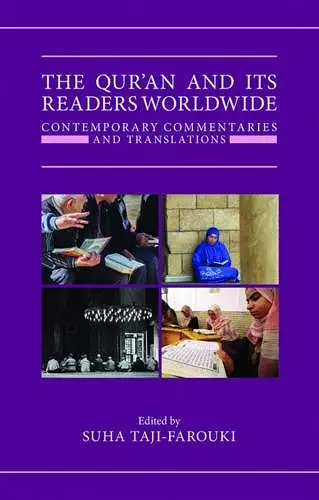The Qur'an and its Readers Worldwide
Contemporary Commentaries and Translations
Format:Hardback
Publisher:Oxford University Press
Published:7th Jan '16
Currently unavailable, and unfortunately no date known when it will be back

Some eighty per cent of Muslims in the contemporary world speak languages other than Arabic, the language of the Qur'an. To respond to the needs of their communities, Muslim scholars and laypersons must increasingly explain and communicate the meanings of the Qur'an in their own languages -- including through the medium of Qur'an commentary and translation. The Qur'an and its Readers Worldwide provides an introduction to this rich and expanding field of endeavour. It brings together a selection of Qur'an commentaries and translations produced across the twentieth century to the present day, and ranging in provenance from the regions of the traditional Islamic heartlands to the new loci of global Islam. Individual chapters examine works in Arabic, Bosnian, Chinese, English, German, Malay, Persian, Swahili, Turkish and Urdu, each viewed in terms of the impact of modernity on the encounter with the Qur'an, providing an English readership with an exceptionally broad overview. Situating these works in their cultural and national settings, this volume focuses attention on the relationship between language, culture and sociopolitical environment in Qur'an commentary and translation. It highlights the linkages between the Qur'an translations and commentaries studied and the developments and debates that generated them, and to which they respond, whether associated with colonial realities, the challenges of nation building, or the search for ways to reconstruct Islamic culture in the face of new legal frameworks or societal models. Through a detailed introduction and a series of case studies this book illustrates the defining trends in Qur'an commentary worldwide, addressing evolving questions of authorship, message, intended readership and media of communication. It highlights the continued relevance of Qurâan commentary as an authoritative Islamic tradition in a period of growing direct engagement with the sacred text. It also samples debates concerning Qur'anic meaning in translation that are pertinent for many millions of Muslims today, and that look set to grow in tandem with globalisation.
The chief benefit [of the work] is its enormous scope. It notes almost all the vernacular linguistic traditions within the large arc of Muslim observance across Africa and Asia. It also has substantial chapters on [American,] Turkish, Persian, Arabic, Bosnian, German, and Chinese exegetes and/or translators. * Andrew Rippin, Professor Emeritus of Islamic History, Department of History, University of Victoria *
This broad-gauged yet coherent volume focuses on translation as a strong unifying theme. It will attract all those engaged by the layers of meaning within the Qur'an. Some will find their attention drawn to novel elements previously unknown to them, but all will be riveted by the numerous strategies and challenges of translating the Qur'an, with equal accent on accessibility to the original text and adaptation to myriad local contexts. * Bruce Lawrence, Emeritus Professor of Islamic Studies, Duke University and author of Who is Allah? *
Without exception each individual chapter has been written by scholars with an impressive mastering of their topic and each chapter has interesting and, at least to me, new information and insights to offer. * Nico J.G. Kaptein, BiOr *
ISBN: 9780198754770
Dimensions: 223mm x 153mm x 54mm
Weight: 952g
600 pages